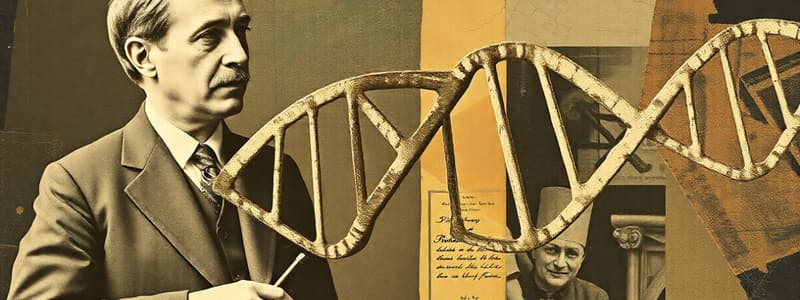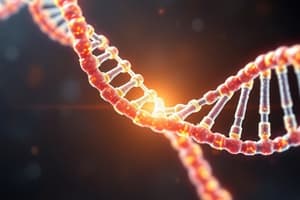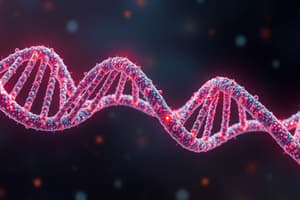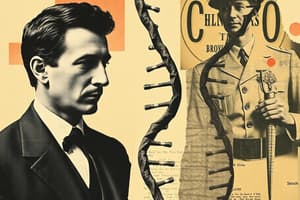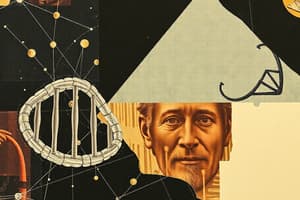Podcast
Questions and Answers
What significant scientific breakthrough is Francis Crick celebrated for?
What significant scientific breakthrough is Francis Crick celebrated for?
- The invention of the acoustic mine
- The discovery of DNA's structure (correct)
- The creation of a molecular biology lab
- The founding of the Human Genome Project
At what age did James Watson start his undergraduate studies at the University of Chicago?
At what age did James Watson start his undergraduate studies at the University of Chicago?
- 20
- 15 (correct)
- 12
- 17
Which laboratory did both Francis Crick and James Watson join during their research careers?
Which laboratory did both Francis Crick and James Watson join during their research careers?
- Max Planck Institute
- Cavendish Laboratory (correct)
- Cold Spring Harbor Laboratory
- MIT Genetics Lab
In what year did Crick receive the Nobel Prize?
In what year did Crick receive the Nobel Prize?
Which of the following best describes James Watson's contribution to DNA research?
Which of the following best describes James Watson's contribution to DNA research?
What was one of the main focuses of Francis Crick's research after moving to California in 1976?
What was one of the main focuses of Francis Crick's research after moving to California in 1976?
What milestone event occurred in 1953 concerning both Crick and Watson?
What milestone event occurred in 1953 concerning both Crick and Watson?
What role did James Watson have at Harvard starting in 1960?
What role did James Watson have at Harvard starting in 1960?
Which statement accurately describes the early career paths of Crick and Watson?
Which statement accurately describes the early career paths of Crick and Watson?
What was a significant focus of James Watson's research after his early contributions to DNA structure?
What was a significant focus of James Watson's research after his early contributions to DNA structure?
In which of the following aspects did Crick and Watson's work significantly overlap?
In which of the following aspects did Crick and Watson's work significantly overlap?
What distinguishes Crick's formal education from Watson's?
What distinguishes Crick's formal education from Watson's?
Which of the following honors did Crick receive for his contributions to science?
Which of the following honors did Crick receive for his contributions to science?
What influenced Crick's transition from physics to biology?
What influenced Crick's transition from physics to biology?
What notable change occurred in Watson's career after 1960?
What notable change occurred in Watson's career after 1960?
Which quote best reflects the significant philosophy of scientific research upheld by Watson?
Which quote best reflects the significant philosophy of scientific research upheld by Watson?
Study Notes
Francis Crick
- British biophysicist who won the Nobel Prize in 1962
- Worked on the discovery of DNA's structure in 1953
- Studied physics at University College London and later worked in mines and with the Royal Navy
- Joined the Cavendish Laboratory in 1949, where he met James Watson
- Completed his PhD in 1954
- Made key contributions to understanding the genetic code
- Moved to California in 1976 to study developmental neurobiology and human consciousness
- Received the Nobel Prize in 1962 and several medals from the Royal Society
- Stated "the genetic code is...the key to molecular biology"
James Watson
- US geneticist and biophysicist
- Enrolled at the University of Chicago at the age of 15 and earned a degree in zoology in 1947
- Played a crucial role in discovering the double helix structure of DNA in 1953
- Moved to the Cavendish Laboratory in Cambridge in 1950 to work with Francis Crick
- Completed his PhD in 1950
- After publishing the DNA structure paper, briefly moved to California then returned to Cambridge to study viruses
- Became a professor of biology at Harvard in 1960 and published key biological texts
- Led the leading center of molecular research and the Human Genome Project in 1989
- Said "In science there is only one answer and that has to be correct."
Key Milestones
- Both Crick and Watson completed their PhDs around 1950.
- They met in 1951.
- They published the DNA structure paper in 1953.
- Crick received the Nobel Prize in 1962.
Francis Crick
- British biophysicist
- Won the Nobel Prize in 1962
- Discovered the structure of DNA in 1953 with James Watson
- Studied physics at University College London
- Joined the Royal Navy to develop mines during WWII
- Worked at the Cavendish Laboratory in Cambridge and met James Watson in 1951
- Earned his PhD from Cambridge University
- Researched the genetic code
- Moved to California to study neurobiology and human consciousness
- Received several medals from the Royal Society
- "The genetic code is...the key to molecular biology."
James Watson
- American geneticist and biophysicist
- Enrolled at the University of Chicago at age 15
- Moved to the Cavendish Laboratory in Cambridge in 1950
- Discovered the structure of DNA in 1953 with Francis Crick
- Earned his PhD from Cambridge University
- Published on DNA structure with Crick
- Worked on virus construction
- Became a biology professor at Harvard
- Led the Human Genome Project
- "In science there is only one answer and that has to be correct."
Studying That Suits You
Use AI to generate personalized quizzes and flashcards to suit your learning preferences.
Description
Test your knowledge on the groundbreaking contributions of Francis Crick and James Watson to the understanding of DNA's structure. This quiz covers their early lives, scientific achievements, and the historical context of their discovery. Dive into the world of molecular biology and genetics through this engaging quiz.
